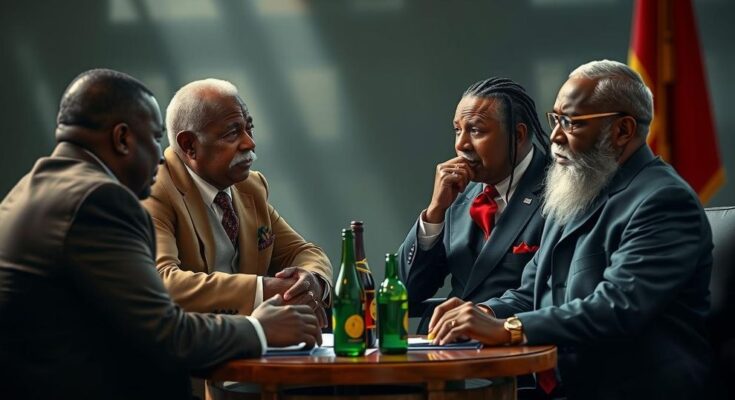The DRC is rife with leadership failures and ethnic division, echoing a narrative of sadness as expressed by PLO Lumumba and highlighted in the actions of current politicians. Despite Kwame Nkrumah’s vision for a united Africa, the DRC’s political leaders continue to exacerbate divisions, notably targeting ethnic groups like the Congolese Tutsis. Looking back, the legacies of earlier leaders signal the urgent need for cohesive governance to ensure a peaceful and united future for the DRC.
The Democratic Republic of Congo (DRC) stands at a crossroads, shackled by historical misgovernance and waning leadership, perpetuating a narrative of sadness and division among its people. As articulated by Patrick Loch Otieno Lumumba, formidable issues plague the nation; however, Kwame Nkrumah proposes a potential path forward framed within the context of a united Africa. Recent remarks from DRC officials demonstrate prevailing animosity toward ethnic groups such as the Congolese Tutsis, exacerbating tensions and drawing attention to the broader implications of ethnic politics in the DRC. Minister of Justice Constant Mutamba’s incendiary comments regarding the M23 rebels reveal troubling patterns of discrimination and a troubling disregard for the complexity of Congolese identity. The façade of leadership in the DRC has been criticized; the legacies of previous leaders such as Patrice Lumumba and Mobutu Sese Seko are discussed, suggesting that the nation has been hindered by their successors’ inadequate governance, which struggles to unite rather than divide. Amidst these controversies, it appears that nostalgia for Mobutu’s unapologetically nationalistic rhetoric and attempts at unity offer a stark contrast to the current climate of fear and scapegoating in the DRC. Today’s leadership, in an effort to shield themselves from accountability, has fostered divisions, calling into question the future trajectory of the DRC amid increased ethnic strife and geopolitical tensions with neighboring Rwanda.
The Democratic Republic of Congo (DRC) has a complex and tumultuous history marked by the impacts of colonialism, political instability, and chronic ethnic tensions. The leadership style and policies of past leaders like Patrice Lumumba and Mobutu Sese Seko have generated significant discussion regarding the effectiveness of governance in the DRC. Current political dynamics have been further complicated by external influences, particularly from Rwanda, leading to accusations of ethnic bias and political persecution. Amid this backdrop, the DRC continues to grapple with its identity and the quest for unity, thrusting its citizens into a cycle of distrust and division.
The ongoing struggles within the DRC underscore the necessity for authentic leadership capable of fostering unity rather than discord among its diverse populations. As articulated by historical figures such as Kwame Nkrumah, the importance of effective governance remains paramount. The leadership’s failure to address ingrained issues of ethnicity and discrimination not only perpetuates suffering but also threatens the very fabric of Congolese society. In seeking a better future, fostering a true sense of nationhood through dialogue and reconciliation is crucial.
Original Source: www.newtimes.co.rw




